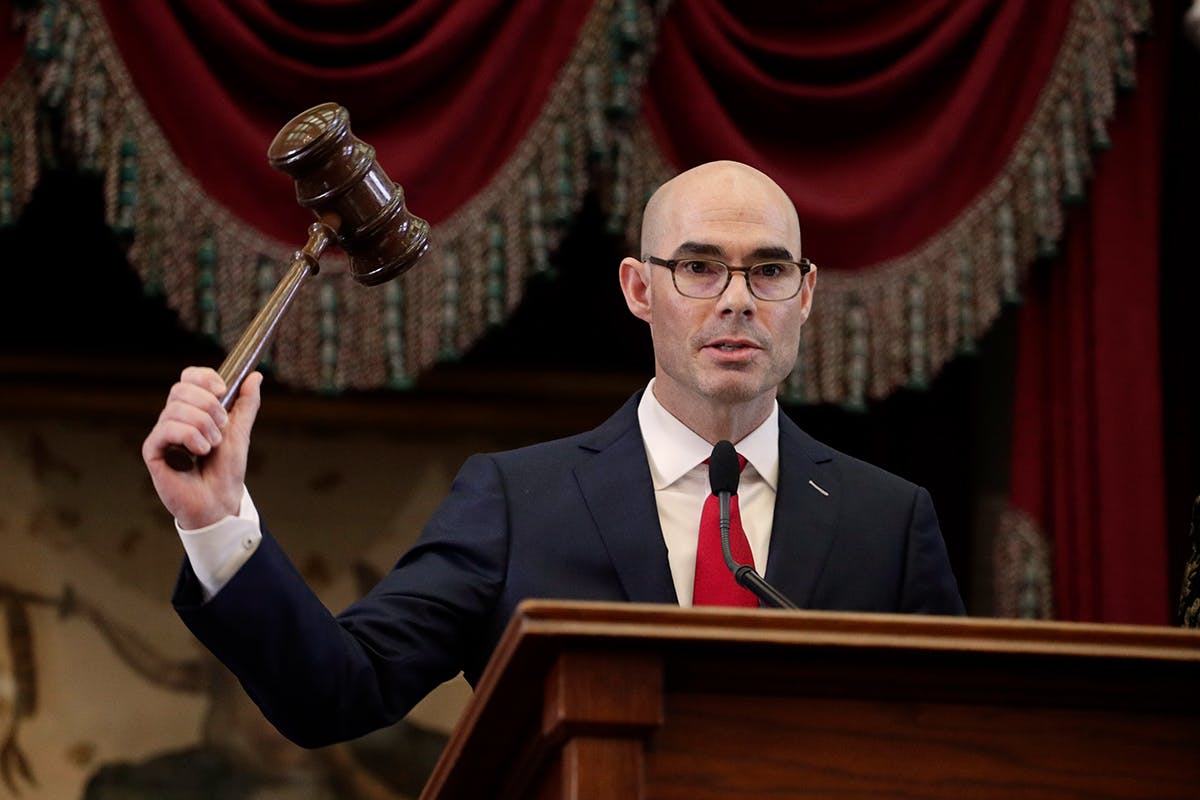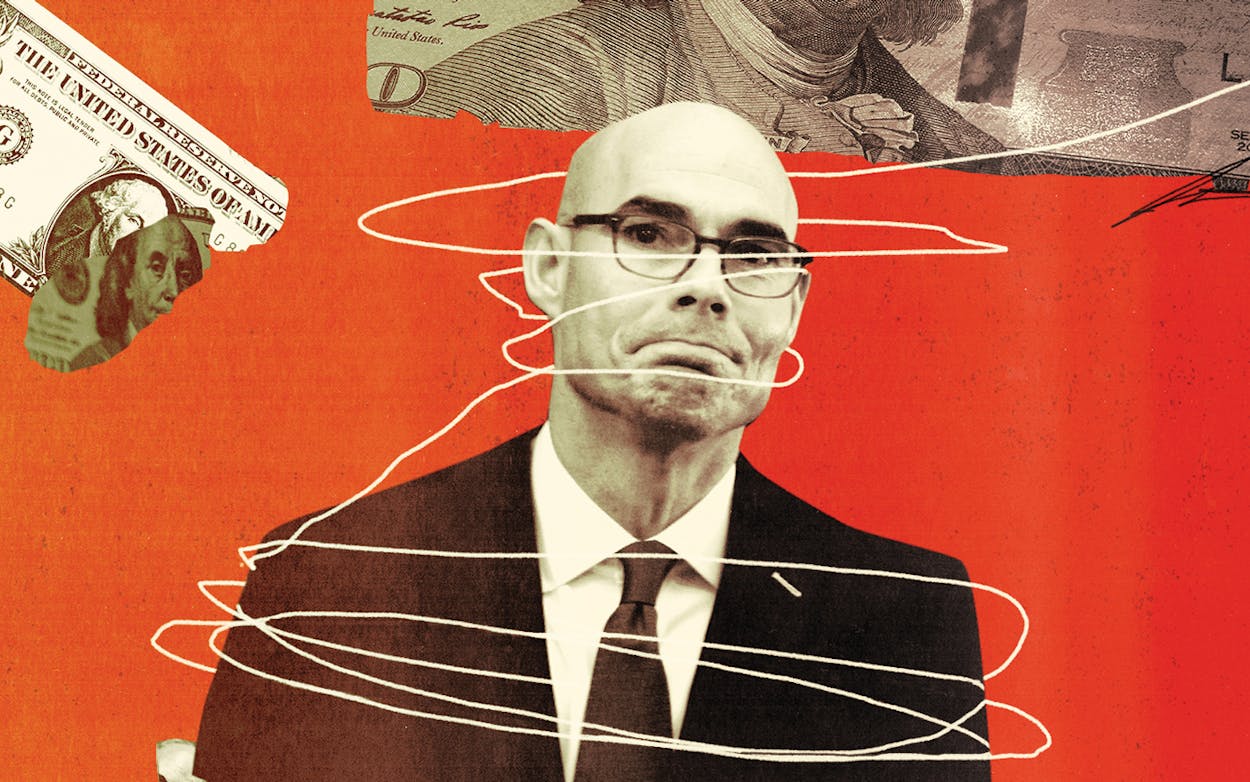Long before Texas produced oil, microchips, and subdivisions, it produced politicians. Talented ones! From the days when Native American leaders concocted elaborate ruses to con the Spanish into taking on their tribal enemies to the golden era of Sam Rayburn, Bob Bullock, and a couple of Bushes, this state has been a magnet and a factory for preternaturally gifted schemers. The LBJ of Robert Caro’s volumes has become the English-speaking world’s archetype of the politician as antihero, a figure of humble origins from a tiny Texas town whose manifest talents and personal flaws bloom to change the world in ways that are both wonderful and horrifying. You might have liked Johnson or Rayburn or a Bush or two, or you might have hated them. But you couldn’t help but be transfixed by them.
This year, Texas has been transfixed by the unwavering rise and precipitous fall of House Speaker Dennis Bonnen, but for very different reasons. It took 22 years for Bonnen to win control of the state’s august lower chamber but just six months for him to commit political suicide, when he tried to make a Faustian bargain with one of his biggest enemies—who happened to be wearing a wire. Bonnen’s story reads like a tragicomic twist on Caro’s LBJ myth, perhaps indicating that Texas, as it shuffles deeper into the twenty-first century, isn’t making them like it used to. What’s happened to us? Maybe it’s the schools.
Bonnen’s career started propitiously, at least for storytelling purposes: a small-town boy from oil and gas country matriculates not at the University of Texas or Texas A&M— the usual breeding grounds for members of the Lege—but at Austin’s St. Edward’s University, which is perched atop a hill on South Congress Avenue, looking north to the seat of power. All very literary. Having struggled with dyslexia as a kid, Bonnen may have developed a chip on his shoulder, a detail his later biographers could seize on to explain his passionate crusade for justice, or injustice, or whatever. Just three years out of high school, he was appointed a sergeant at arms on the House floor. There, Bonnen got a taste of the game, and after winning election to the House a few months shy of his twenty-fifth birthday, he dedicated his life to the chamber. There’s your first volume: The Precocious Path to Power.
He dug in. Other people saw the statehouse as a stepping-stone, but Bonnen saw its peculiar rewards and debaucheries and intrigues as the prize; he was an inveterate Lege rat, a longtime hanger-on. He was a fighter and a bully and earned the nickname “Dennis the Menace.” He carried water for industry, was rewarded with campaign support, and opened a commercial bank back home in Brazoria County, south of Houston. Many politicians do that sort of thing for years and are content with the modicum of fame and wealth their positions afford them. But Bonnen was different. Hungry.
By the 2013 session, he had become House Speaker Joe Straus’s number two, and in 2019, after Straus stepped down, he took the gavel himself. By then, he was the eighth-longest-serving member of the House, despite being only 46. In a chamber where old men hold sway, Bonnen’s relative youth, accentuated by his boundless energy and chrome dome, gave him a kind of Doogie Howser class president quality, despite his bad temper. There’s the second volume; call it Mean in Ascent.
Now comes the redemption part of the narrative, Master of the House. Bonnen’s first session as Speaker went well. Too well. Spookily well. The Menace was gone. Bonnen won praise from Democrats and Republicans, the governor, the lieutenant governor, and the fourth estate. (In our recent Best and Worst Legislators list, this magazine enthusiastically placed him among the former, saying, “The state should be thankful that new House Speaker Dennis Bonnen managed to keep alive the noble tradition of restraint.”)
His internal party enemies fell to pieces. A few months after the session, his commercial bank merged with another, a deal that made him vice chairman of a much bigger bank. Life was sweet. He seemed guaranteed many more years in power, with time to fill in those last couple volumes. What great deeds might this great man now accomplish?
Alas, we’ll never find out. A few weeks after his legislative triumph, Bonnen, perhaps having suppressed his combative impulses for too long, scheduled a meeting with right-wing activist Michael Quinn Sullivan, who was not only one of the least trustworthy figures in Texas politics but also someone who had repeatedly made clear he didn’t like Bonnen at all. His animus was largely rooted in the fact that Bonnen had occasionally proven himself an obstacle to the plutocratic, Christian-supremacist vision of Texas promoted by the handful of reactionary oil men who bankroll Sullivan’s pressure group, Empower Texans.

When they met in the Speaker’s office, Bonnen offered Sullivan a deal: If Sullivan provided a quo, Bonnen would pony up a quid. Bonnen offered to give the foot soldiers of Empower Texans press passes that would allow them free rein of the House floor, so long as Sullivan directed his millions of dollars in campaign spending to knock off ten Republicans whom Bonnen—to the puzzlement of many—regarded as his enemies.
Bonnen, in short, had rung up the man voted “Most Likely to Blackmail Dennis Bonnen” in the Lege yearbook and handed him a folder full of blackmail material, including calling some of his House colleagues “dumb,” “vile,” and secretly “gay” and referring to city and county elected officials in the aggregate as “dumbass[es].”
When Sullivan, a few weeks after the meeting, wrote about it at length on one of his websites, Bonnen issued some flagrantly misleading denials. He sent his hapless lieutenant, state representative Dustin Burrows, who had accompanied him to the meeting, into a witness protection program of his own devising. And then it emerged that Sullivan had secretly recorded the entire affair.
The tape of the meeting, which, after a three-month wait, was finally released in October, is a dramatic masterwork that bears multiple listenings to catch each Easter egg and odd slip. As Bonnen digs himself deeper into his hole, Sullivan keeps laughing in an unnerving way. The three disagree over whether Sullivan had once called Burrows a “moron” or simply “moronic.” Sullivan reminisces about Bonnen’s erstwhile “glorious mane of hair,” as if reflecting in real time on the speaker’s rapidly fading glory. Sullivan repeatedly attempts to steer the conversation away from the bribe, only to have Bonnen return to the matter again and again in increasingly direct language. “You need to hear what I want to do for you,” Bonnen says.
There’s another thread that runs through the recording, of Bonnen describing the various schemes and tricks he played on his enemies during the legislative session. Jamming up local officials by scheduling hearings at competing times, wrong-footing Democrats, slagging less capable Republicans. (Even after the tape’s release, the scheming continued—his interim charges for the 2021 session contain a number of new bids to screw with the great villains of our state, mayors and county judges.) The impression is of a man, utterly convinced of his own abilities, role-playing an LBJ figure who is not aware he’s the character in a volume called The Passage from Power. But there will be no five-part biography of Bonnen. His legacy is a 62-minute recording, barely a podcast episode.
Not even Bonnen’s end was epic. Desperate to hang on, he announced his retirement under great duress, after pressure was applied by his bewildered comrades. Among them, U.S. Energy Secretary Rick Perry, who reportedly called one of Bonnen’s legislative colleagues to make clear that Donald Trump’s reelection campaign feared that Bonnen’s corpse was dragging down the team in Texas. (This after Bonnen had been heard, on Sullivan’s tape, opining that Trump was dragging down Republican legislative candidates.) Imagine that—the swing of the ax coming from Rick Perry, somehow finding time away from his own role in a mushrooming, presidency-imperiling international corruption scandal in Ukraine.
Beyond partisanship and ideology, there’s something about the abrupt end of Dennis the Menace that’s insulting to state pride. We used to make movers and shakers! Champions of rural electrification! Of civil rights! Manic-depressive manipulators! World striders! Enders of the Cold War and upenders of the Middle East! Now we have small people, playing small games, for small stakes, like where and how Texans go to the potty.
We’re clearly losing our edge. Sure, there have always been a few dozen half-wits for every titan that Texas politics churned out. But the machine that separates wheat from chaff seems to be in need of some blade sharpening. In the past decade, our political scene has offered a few failed presidential candidates, a couple of indictments, and a handful of arrests. It has left us with a demoralizing sense that our public servants have forsaken the long game and the big score for the petty grift and the quick hit. It’s one thing to be wicked and effective, as LBJ was for so long. It’s another thing entirely to be bad at being bad.
And so, for his vivid demonstration to our fellow Americans that Texas politicians have lost their Machiavellian flair, Dennis Bonnen richly deserves to win the other half of our Bum Steer of the Year Award.
This article originally appeared in the January 2020 issue of Texas Monthly with the headline “Boy Blunder.” Subscribe today.







